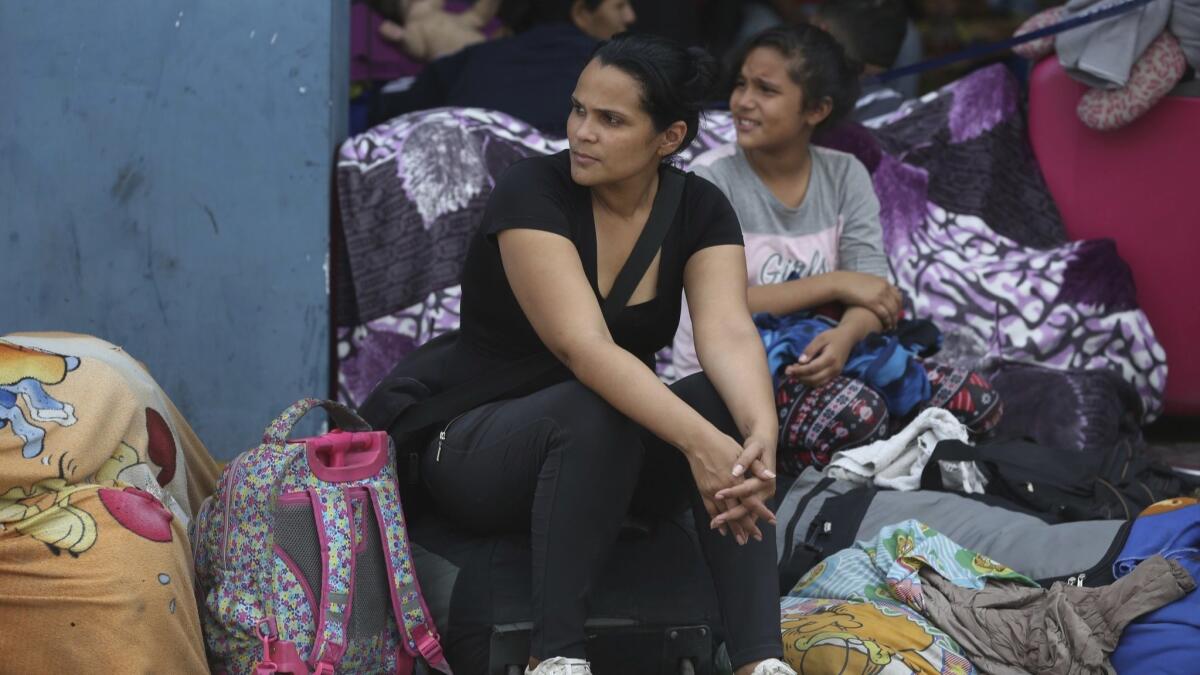Venezuelans now file 1 in 5 of all new asylum claims worldwide, U.N. says

- Share via
Reporting from LIMA, Peru — When Johan Alvarez was unable to provide more than one meal a day for his young family, he knew it was time to leave Venezuela.
With his wife and infant son, the 25-year-old embarked on a lengthy journey by bus through three nations to reach Peru earlier this year.
Now they are among a growing tide of Venezuelans asking to be recognized as refugees.
A United Nations report released Wednesday finds that Venezuelans represent the largest group worldwide filing new asylum claims. Those fleeing the troubled South American nation made more than one in five of all asylum requests in 2018, higher than the number of claims made by people escaping Afghanistan and Syria.
But Venezuela is not in the midst of war and many foreign governments are reluctant to recognize the migrants as refugees.
On a recent overcast day in Peru’s capital, Alvarez filed into a line with about 100 other Venezuelan arrivals filing for asylum, hoping his family’s tale of hunger back home would be enough to earn them refugee status.
“It’s not a war of arms,” he said. “But it is a war of survival.”
Venezuela, now a top source of U.S. asylum claims, poses a challenge for Trump »
As Venezuela’s crisis drags on, the number fleeing is rising by an alarming rate. The United Nations estimates there are now 4 million Venezuelans living abroad — a quarter of whom have fled since November. The Organization of American States estimates the number could reach 7.5 million by the end of 2020.
The widely used definition of refugee is someone who has fled his or her homeland because of persecution, war or violence. Asylum claimants typically have to show that they cannot return due to a well-founded fear of persecution because of race, religion, nationality, political opinion or membership in a particular group.
But a more encompassing definition in the 1984 Cartagena Declaration includes people fleeing hunger and poverty resulting from the breakdown of the rule of law — conditions being experienced by a much wider group of Venezuelans.
To date, more than 460,000 Venezuelans have sought asylum, including nearly 350,000 in 2018 alone, according to the U.N. A large number of those claims are being filed in Peru, where some 800,000 Venezuelans now reside.
Last year, Peru received 192,500 claims — an astoundingly high number that has created a backlog. Just over 1,000 Venezuelans have gotten their asylum requests approved. Worldwide, only about 21,000 Venezuelans have been recognized as refugees to date.
The U.N. report notes that the Venezuela migration crisis has increasingly taken on the “characteristics of a refugee situation” and says it is clear that international protection considerations “are applicable to the majority of Venezuelans.” Such protections could spare them from deportation.
“People fleeing Venezuela are doing so in increasingly complex circumstances,” said Federico Agusti, the U.N. refugee agency’s representative in Peru. “It’s not just a humanitarian crisis. The reason they had to leave is because their life was in danger.”
More to Read
Sign up for Essential California
The most important California stories and recommendations in your inbox every morning.
You may occasionally receive promotional content from the Los Angeles Times.













